
Journal of Optics-India
metrics 2024
Exploring the Depths of Optical Knowledge
Introduction
The Journal of Optics-India, published by SPRINGER INDIA, serves as a vital platform dedicated to advancing research in the field of optics, focusing on topics in both atomic and molecular physics. With an ISSN of 0972-8821 and an E-ISSN of 0974-6900, the journal has been a consistent contributor to the field since its inception in 1996 and continues to thrive with its anticipated convergence through 2024. Although currently classified in Q3 of the 2023 category quartiles, the journal actively seeks to elevate its standing within Scopus rankings in physics and astronomy, where it holds a rank of 143/224, indicating significant opportunities for growth and research impact. The Journal of Optics-India is committed to fostering innovative research and providing scholars and practitioners with access to cutting-edge findings, thereby enhancing global conversations around optics and its vast applications. As a reliable source for researchers, professionals, and students alike, the journal emphasizes quality contributions that shape the future of optical science.
Metrics 2024
 0.29
0.29 1.60
1.60 1.40
1.40 23
23Metrics History
Rank 2024
Scopus
IF (Web Of Science)
JCI (Web Of Science)
Quartile History
Similar Journals
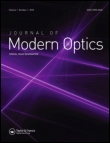
JOURNAL OF MODERN OPTICS
Transforming Insights into Optical ApplicationsJOURNAL OF MODERN OPTICS, published by Taylor & Francis Ltd, stands as a prominent bi-monthly journal contributing to the fields of Atomic and Molecular Physics and Optics. With an ISSN of 0950-0340 and an E-ISSN of 1362-3044, this journal aims to disseminate high-quality research that pushes the boundaries of optical science and its applications. Since its inception in 1981, and particularly throughout its publications from 1987 to 2024, the journal has consistently published influential studies that are essential for both academic researchers and industry professionals. Ranked in the Q3 quartile for the 2023 category of Atomic and Molecular Physics and Optics, it has a Scopus ranking of #133 out of 224, indicating its steady presence and relevance in the scientific community. Although it does not offer Open Access options, readers can access its rich repository of literature that delves into innovative optical methods, technological advancements, and theoretical frameworks. The JOURNAL OF MODERN OPTICS is an indispensable resource for those seeking to advance their knowledge and research in modern optical science.

OSA Continuum
Illuminating Research in Atomic and Molecular PhysicsOSA Continuum, published by the Optica Publishing Group, is a distinguished open access journal dedicated to advancing research in the realms of Atomic and Molecular Physics, Optics, and Electronic and Electrical Engineering. Since its inception in 2018, this journal has rapidly positioned itself as a significant platform for disseminating cutting-edge findings, achieving impressive Scopus rankings with a 61st percentile in Electrical and Electronic Engineering and 57th in Atomic and Molecular Physics. Based in the United States, the journal not only promotes scholarly dialogue among researchers and professionals but also plays a crucial role in bridging theoretical advances with practical applications in optical and material sciences. Its open access format ensures broader visibility and accessibility of research outputs, fostering innovation and collaboration across disciplines. With its ongoing commitment to excellence, OSA Continuum is crucial for anyone involved in these dynamic fields.
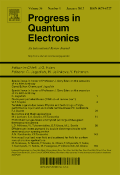
PROGRESS IN QUANTUM ELECTRONICS
Driving Progress in Atomic and Molecular PhysicsPROGRESS IN QUANTUM ELECTRONICS, published by PERGAMON-ELSEVIER SCIENCE LTD, is a premier international journal that serves as a critical forum for the dissemination of high-quality research in the fields of atomic and molecular physics, electrical engineering, and materials science. With its esteemed Q1 category ranking in several disciplines, including Atomic and Molecular Physics, Electrical and Electronic Engineering, and Electronic, Optical and Magnetic Materials, this journal commands a high impact factor and is recognized for its rigorous peer-review process. Established in 1969 and evolving through various phases, the journal currently compiles cutting-edge research that drives advancements in quantum technologies. Researchers, professionals, and students alike are invited to explore a wealth of knowledge and stay updated on pioneering developments in quantum electronics, enhancing their understanding and contributing to the progression of this dynamic field.

Korean Journal of Optics and Photonics
Pioneering Research in Light and VisionKorean Journal of Optics and Photonics is a premier publication dedicated to advancing knowledge in the rapidly evolving fields of optics and photonics. Published by the esteemed Optical Society of Korea, this journal serves as a vital platform for researchers, professionals, and students seeking to disseminate their findings and innovations in areas such as optical engineering, photonics technologies, and application developments. Although the journal does not operate under an Open Access model, it is committed to high-quality peer-reviewed research that contributes significantly to both theoretical and practical advancements in the field. With an increasing focus on interdisciplinary research, the Korean Journal of Optics and Photonics is poised to play a crucial role in fostering collaboration and driving the global conversation on light science and technology. The journal's ISSN is 1225-6285 and it also carries the E-ISSN 2287-321X, ensuring its availability to a wide readership.
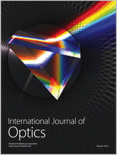
International Journal of Optics
Shaping Tomorrow’s Discoveries in OpticsWelcome to the International Journal of Optics, a distinguished publication dedicated to advancing the field of optics and its interdisciplinary applications. Published by HINDAWI LTD, this open-access journal has been pivotal in fostering knowledge since its inception in 2009. With a robust focus on atomic and molecular physics as well as electronic, optical, and magnetic materials, the journal has carved its niche within Q3 quartile rankings in these categories for 2023, signifying its growing impact and relevance in the scientific community. Researchers and professionals will find a rich repository of innovative and cutting-edge research articles that not only address fundamental aspects of optics but also explore practical applications across various domains. The journal's aim is to promote high-quality research dissemination, enhancing collaboration among scientists and ensuring that pivotal findings reach a global audience. Join us in exploring the dynamic world of optics—where your contributions help shape the future of science.
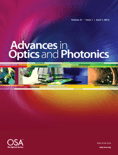
Advances in Optics and Photonics
Driving Innovation in Atomic and Molecular PhysicsAdvances in Optics and Photonics, published by the Optica Publishing Group, stands at the forefront of research dissemination in the fields of Atomic and Molecular Physics and Optics, alongside its prominence in Water Science and Technology. With an impressive Q1 ranking in both categories and a Scopus rank of #2/224, this journal boasts a 99th percentile status, underscoring its significance in the academic community. As a beacon of knowledge since its inception in 2009, the journal is dedicated to featuring cutting-edge research, innovative methodologies, and transformative applications in optics and photonics that can drive advancements across diverse scientific domains. While not an open-access journal, it provides vital insights for researchers, professionals, and students eager to stay updated on emerging trends and breakthroughs. With a convergence period extending to 2024, Advances in Optics and Photonics is positioned as an essential resource for anyone looking to explore the evolving landscape of light-based technologies.
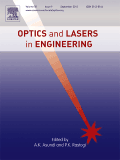
OPTICS AND LASERS IN ENGINEERING
Illuminating Innovations in Laser TechnologyOPTICS AND LASERS IN ENGINEERING, published by Elsevier Science Ltd, is a premier journal dedicated to advancing the field of optics and laser technology in engineering applications. With a robust ISSN of 0143-8166 and E-ISSN 1873-0302, this journal is positioned within the top quartile (Q1) across several categories, including Atomic and Molecular Physics, Electrical Engineering, and Mechanical Engineering as of 2023, showcasing its prestige and impact in the scientific community. The journal has consistently ranked high in Scopus, notably within the top 10% for Mechanical Engineering and Electronic, Optical, and Magnetic Materials research. Since its inception in 1980, OPTICS AND LASERS IN ENGINEERING has served as a vital platform for disseminating cutting-edge research, fostering innovation and collaboration among researchers, professionals, and academia. Though it does not currently offer Open Access options, its high impact factor and selective publication process ensure that articles reach a wide audience while maintaining rigorous academic standards. Researchers and students alike are encouraged to engage with this influential journal to contribute to and stay abreast of advancements in optical technologies and their engineering applications.

Advanced Photonics
Empowering the Global Scientific CommunityAdvanced Photonics, published by SPIE-SOC PHOTO-OPTICAL INSTRUMENTATION ENGINEERS, is a prestigious open-access journal dedicated to cutting-edge research in the fields of photonics, optics, biomedical engineering, and material science. Since its inception in 2019, this journal has successfully established itself in the top quartile (Q1) of various categories, including Atomic and Molecular Physics, Biomedical Engineering, and Electronic, Optical and Magnetic Materials, showcasing its critical role in advancing knowledge and innovation within these disciplines. With impressive Scopus rankings—#8 in Biomedical Engineering, #7 in Atomic and Molecular Physics, and #10 in Materials Science—Advanced Photonics serves as an essential platform for researchers, professionals, and students alike, offering a wealth of accessible scholarly content to keep pace with rapid technological developments. The journal not only fosters collaboration and knowledge dissemination within the global scientific community but also emphasizes the importance of open access to ensure that groundbreaking research benefits society as a whole.
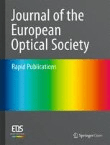
Journal of the European Optical Society-Rapid Publications
Connecting Scholars Through Rapid Optical ResearchJournal of the European Optical Society-Rapid Publications, with ISSN 1990-2573 and published by EDP Sciences S A, is a premier open access journal dedicated to advancing the field of optics and photonics since its inception in 2006. Based in France, this journal serves as a vibrant platform for researchers, professionals, and students to disseminate their findings quickly and efficiently. Achieving a commendable Q3 ranking in Atomic and Molecular Physics and Optics (2023), it reflects a growing impact within the scientific community, despite currently holding a 33rd percentile rank among similar publications in the realm of Physics and Astronomy. The journal fosters an environment of rapid communication and collaboration, making it an invaluable resource for those interested in the latest developments and innovations in optical sciences. With open access ensuring broad visibility for all published work, the Journal of the European Optical Society-Rapid Publications is positioned as a key contributor to enhancing the understanding and application of optical technologies.

Optics is a pioneering open access journal published by MDPI, dedicated to advancing the field of optics and photonics. Since its inception in 2020, the journal has fostered the dissemination of high-quality research and innovative developments in optical sciences, contributing significantly to its community of researchers, professionals, and students in Switzerland and beyond. With an impact factor reflective of its growing prominence, Optics strives to address a diverse scope, encompassing atomic and molecular physics, electronic materials, and broader topics in physics and astronomy. The journal's commitment to open access ensures that cutting-edge research is freely available, promoting collaboration and knowledge-sharing across disciplines. As of 2023, it holds a Q4 ranking in several categories, including Atomic and Molecular Physics, and Optics, which illustrates its evolving role in the academic landscape, positioning it as a valuable resource for those seeking to explore the frontiers of optical technology and its applications.